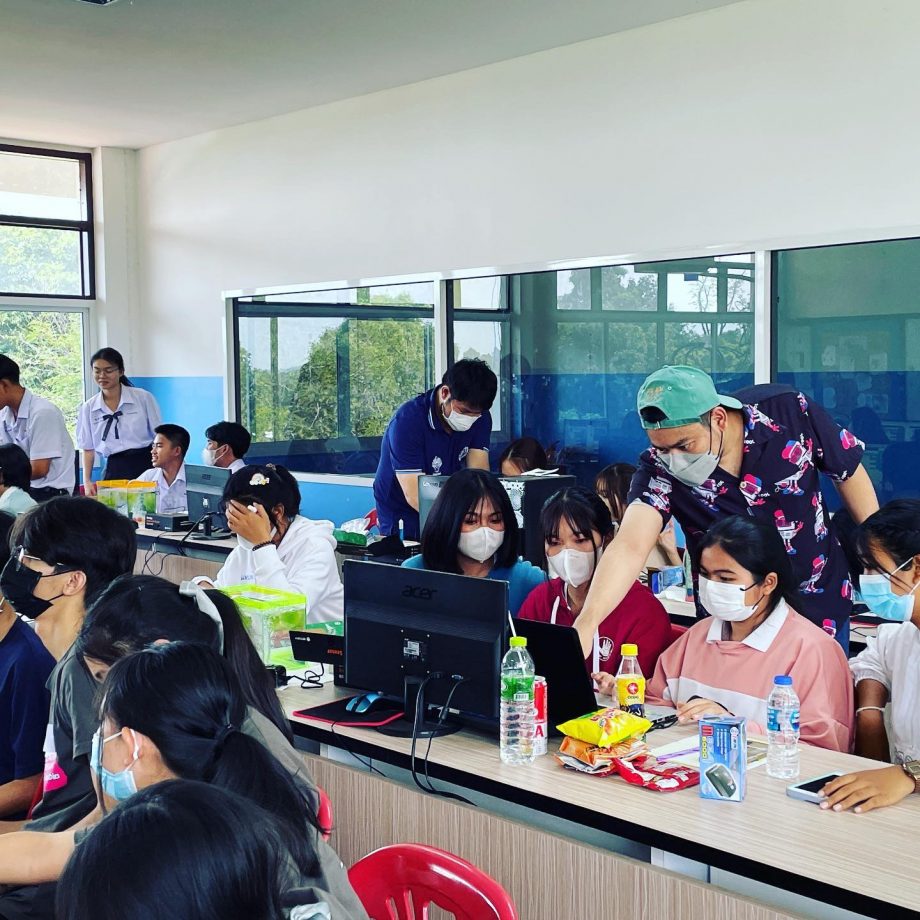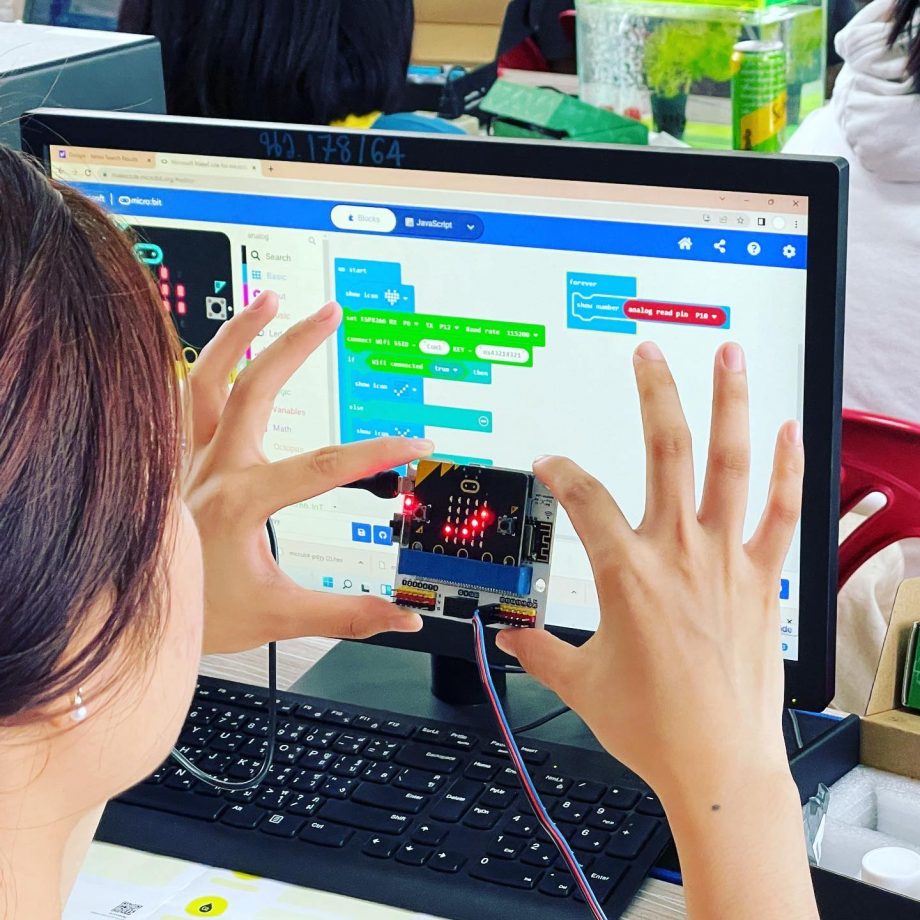Project Case
August 18, 2024
FabCafe Bangkok
Since its establishment in 2015, FabCafe Bangkok has been at the forefront of skill development initiatives, collaborating with renowned organizations from Government agencies to global corporations. Leveraging its extensive experience in creating tailor-made interventions, FabCafe Bangkok was supported by the United States Embassy in February 2023 to increase the number of young women in the technology field by supporting their transition to undergraduate education. This year, the program focused on students residing in the Mekong riverside regions.
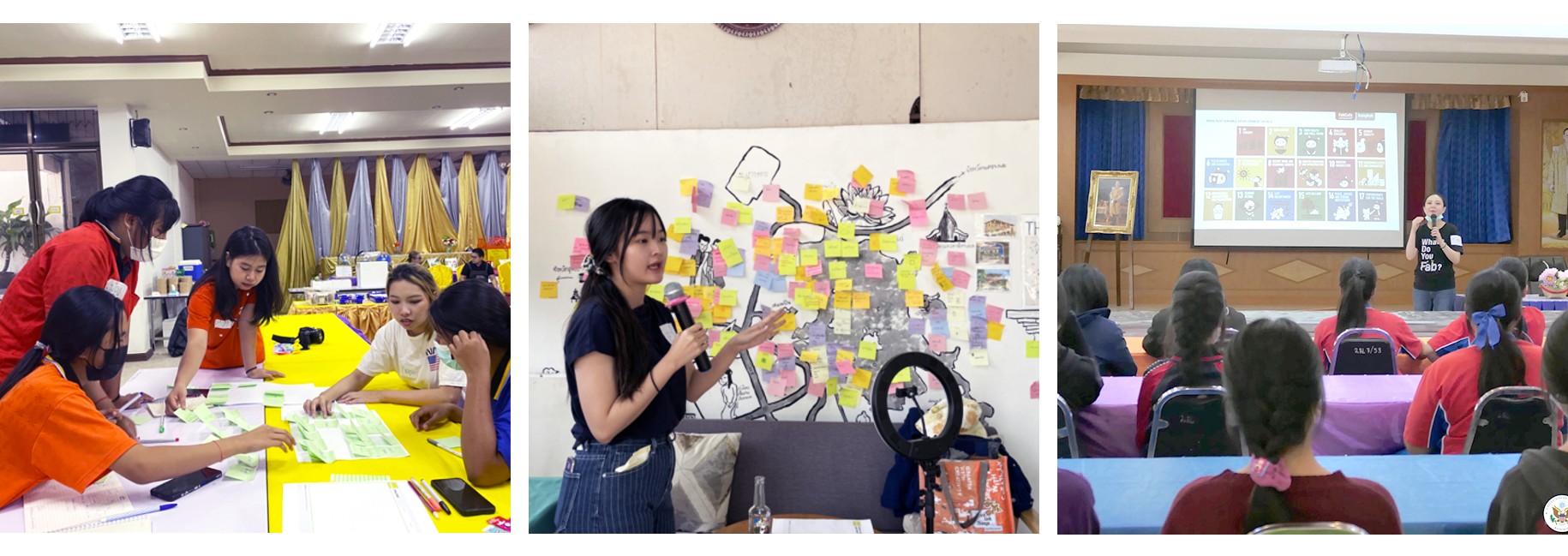
In order to create meaningful engagement, the FabCafe team conducted extensive research to identify the most pressing challenges faced by the local communities. Their focus zeroed in on a critical problem: the severe degradation of the Mekong River caused by climate change and upstream dams, which have altered the natural water flow and disrupted its delicate ecosystem.
By framing the learning sessions within the context of the Mekong River crisis, the program set on to achieve several ambitious objectives, including raising awareness about the transformative potential of technology and business knowledge and initiating impactful projects benefiting the community, the economy, and the environment.

The Mekong River is the third longest in Asia, and one of the richest areas of biodiversity in the world.
FabCafe implemented a transformative two-day program across high schools in Nong Khai, Sakon Nakorn, and Ubon Ratchathani, situated along the Mekong river.
After intensive research, the program identified a remarkable resource with untapped potential: “kai” and “tao,” two types of freshwater seaweed that play a vital role in preserving the health of the Mekong River. Guiding the learning journey and encouraging practical outcomes, tailored goals were devised for each region based on the specific conditions of kai and tao seaweeds in those areas.
Additionally, two standout projects were chosen from each of the three locations. These six teams were then invited to a second workshop held in Nong Khai, where they learned about the core principles and basic technology of IoT farming. This knowledge helped them better understand the technical aspects needed for their respective projects.

Kai and Tao, freshwater seaweed varieties found in thriving regions of the Mekong River, provide vital nutrients and habitat for aquatic life.
Despite being staples in traditional Thai cuisine, “kai” and “tao” seaweed have become relatively unfamiliar to many young people today, including the students in the program. In order to introduce seaweed in an engaging and innovative manner, FabCafe adopted a culinary approach by collaborating with esteemed local chefs. Each session commenced with interactive workshops, where students not prepared seaweed-based recipes.
In them, students gained insights from the chefs into their creative marketing tactics and the expertise that contributed to their success. They also learned the basics of 3D printing and applied them by designing and printing molds for different recipes such as cookies.

A fun introduction to freshwater seaweed: the culinary workshops were an essential part of the program.
The project embraced a comprehensive approach, fueling creativity and motivation while guiding students to create tangible projects from scratch:
・Phase 1: Becoming Drivers of Change. The program started by introducing the students to the challenges of global warming and inspiring them to become change drivers in their own communities by developing solutions based on the triple bottom line: people, planet, and profit.
・Phase 2: Inspiration from renowned local chefs. Renowned local chefs showcased the possibilities of fresh seaweed and provided insights into their creative process to generate unique and attractive ideas.
・Phase 3: Business Knowledge. FabCafe presented fundamental business concepts, empowering students to analyze successful case studies and understand value creation and profit margins.
・Phase 4: Ideation. Students delved into diverse ideation techniques and processes, engaging in free-flowing brainstorming sessions.
・Phase 5: Prototype Presentation. Each group showcased their prototypes, gathering valuable feedback for refinement and improvement. A few selected projects were also presented at Isan Creative Festival for small-scale market testing.
・Phase 6: IoT Farming Practical Workshop. Outstanding ideas were selected for further development and actual prototyping in a workshop taking place in Nhong Kai. The FabCafe team facilitated a coding lesson using Micro:bit, as well as a workshop featuring sensors, 3D modeling and 3D printing.

The program provided a comprehensive approach to equip students with the necessary knowledge and tools.

In the culinary introduction for the program, Chef Weerawat “Num” Triyasenawat, from the Michelin-starred restaurant Samuay & Sons, delved into the modern applications of seaweed in cuisine.
Students utilized 3D-printed cooking molds and cutters during the cooking session, resulting in various contemporary dishes including ravioli, gyoza, pasta, and dumplings.

Moulds and cutters modelled and printed using 3D software.
- Local challenge: the Nong Khai area grapples with the proliferation of harmful algae blooms, posing a threat to aquatic life and causing damage to fishing nets and other vital resources.
- Project outline: Tao+ introduces a pioneering solution in the form of a tailored bio-fertilizer blend. By repurposing excess algae, this innovative project utilizes IoT technology to analyze soil conditions, promoting effective and sustainable agriculture practices.

Presentation slide for the Tao+ project.

Though an in-depth presentation by with local chef Sirisak “Num” Waphakphet from restaurant House Number 1712, students were introduced to the potential of thoughtfully designed cafes and food stalls as platforms for their culinary concepts.
Students delved into the incorporation of seaweed into elevated souvenirs and café offerings, including creatively designed cookies. This exploration involved them in 3D modeling software to create innovative molds inspired by popular local landmarks.


Cookie molds made with 3D software and printing.
- Local challenge: To revitalize existing farms and safeguard the local ecosystem, students set out to discover new value-added opportunities for tao-derived products.
- Project outlines:
- HonKakKai aims at empowering and promoting Thai culinary culture by combining local species such as long pepper (Piper longum) with tao seaweed noodles. The outcome is a vibrant green dish, uniquely different from the typical red spice palette, that highlights the potential of local foods and Thai gastronomy. Students also incorporated global trends like “mukbang” challenges, wherein renowned streamers dine alongside a virtual audience, to strengthen the international projection of Thai culture.
- Tao Tri Thai blends the protein-rich tao seaweed with local farm products like mulberry and Kao Mao (pounded unripe rice) to make a delicious and nutritious power bar.

Concept images for the HonKakKai (left) and Tao Tri Thai (right) projects.

With guidance from Auntie Chef “Fai” Sirorat Thowtho of Michelin-starred restaurant Mok, students were encouraged to think innovatively and explore applications of tao seaweed, including tao yogurt bun and tao omelette.
One of the most popular concepts was laab tao ice cream, a savory instead of sweet ice cream infused with laab, a Thai spicy salad that features tao seaweed in some regions. Diverse consumer bases were considered, extending to pets who can also enjoy this ice cream’s flavor.
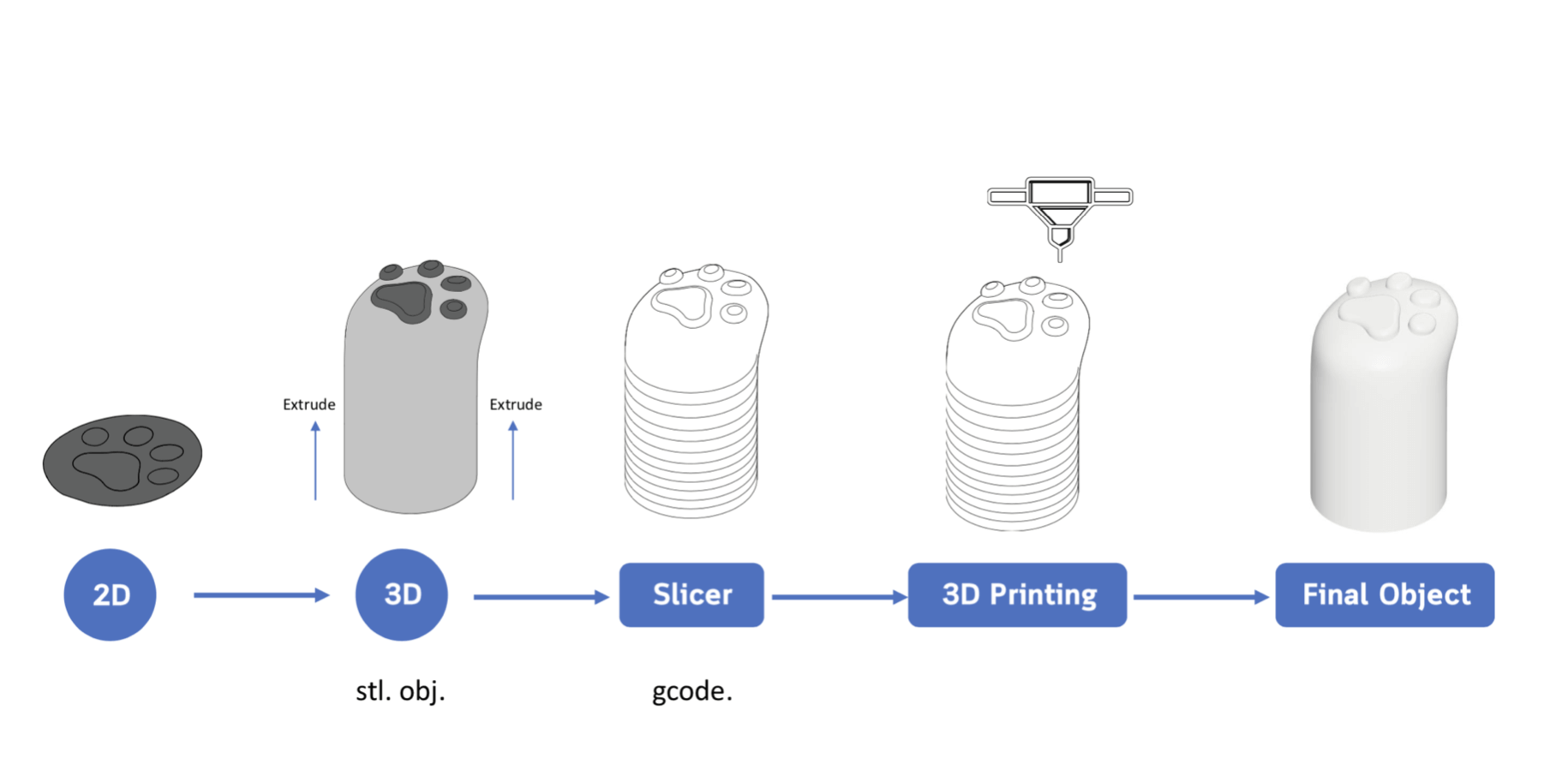
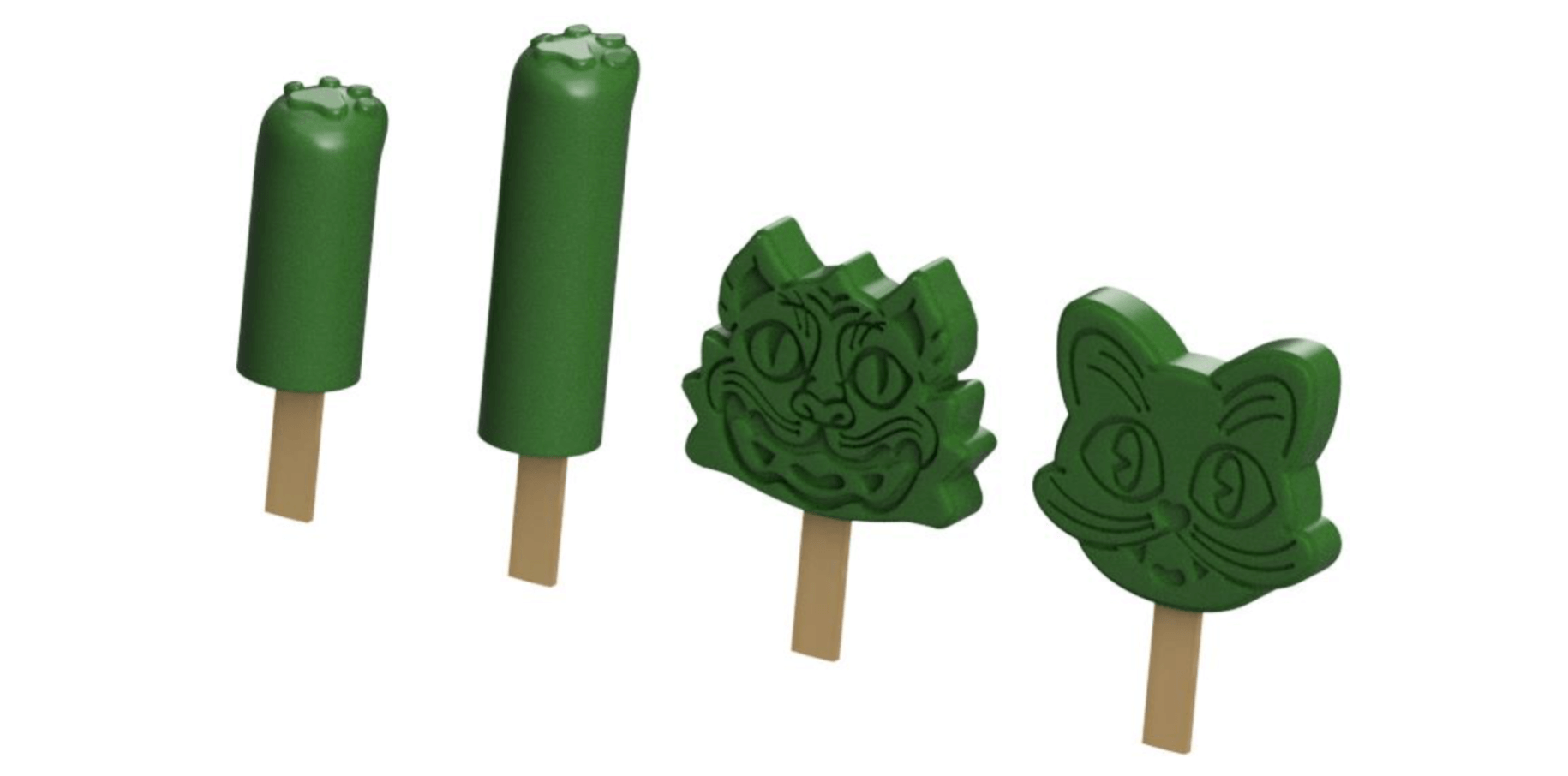


The laab tao ice-cream making process from 3D modeling to the final result. The cute cat shape pays homage to a local cat species and is designed to appeal to pet owners.
- Local challenge: Ubon Ratchathani faces intermittent drought conditions in the Mekong River caused by climate change, resulting in reduced rainfall and higher temperatures. The proliferation of upstream dams exacerbates the situation, affecting the river’s biodiversity, and cultivating healthy tao seaweed becomes crucial in preserving the damaged river beds.
- Project outlines:
- Tao Yong is a proposal to market dried tao seaweed in the form of pork floss, offering an appealing vegetarian meat alternative. Building on a contemporary Thai marketing trend inspired by “mutelu” (traditional good-fortune beliefs), students designed the package with labels corresponding to the buyer’s birthdate, tapping into personalized consumer engagement.
- Khong Chiam Burger is an innovative approach to a popular dish with Vietnamese origins widely beloved in the Ubon Ratchathani region. By adding Tao seaweed to the bun, students created a visual representation of the local Maenam Song Si landmark, the point where the Mun River meets the Mekong in a striking blend of brown and blue.

Presentation slides for the Tao Yong (top) and Khong Chiam Burger (bottom) projects.
FabCafe designed a comprehensive program aimed at fostering innovation, equipping students with essential business knowledge, and developing technical skills, all focused on unleashing the potential of freshwater seaweed. Within a condensed two-day timeframe, each group successfully generated three to five specific projects characterized by their practicality and detailed execution.
Every project presented during the program embraced environmental regeneration as its core objective, empowering participants to actively contribute to the social and economic advancement of their communities. The program’s outputs were viable business plans that added substantial value to existing economic models, emphasizing the significance of a holistic approach that benefits people, protects the planet, and ensures profitability.

Furthermore, the program played a pivotal role in generating awareness and creating a positive environment for local businesses and investors to explore and invest in the kai and tao farming sector. Notably, stakeholders like Chef “Fai” Sirorat Thowtho of Michelin-starred restaurant Mok showed strong interest in seaweed products. This heightened attention has resulted in a surge of investment inquiries for seaweed farming opportunities.
What can we do for you?
Contact us if you are interested in…
- Designing and delivering hands-on skill development initiatives tailored to specific needs such as sustainability.
- Implementing impactful projects in Thailand in collaboration with companies, governmental institutions, and international organizations.
- Ideating and rapid prototyping of innovative product ideas and business opportunities.
- Digital fabrication and advanced technology application.
Program: BizTech Women: Empower Young Women
to Revitalize Their Natural Habitat
Grant Provider: United States Embassy in Thailand
Project time: January to April 2023
Project Members: FabCafe Bangkok. Project director: Kalaya Kovidvisith (FabCafe Bangkok founder). Assistants: Chonthicha Arunrungkaokai.
Project Partners: Creative Economy Agency, Khon Kaen Branch. Chefs: Weerawat “Num” Triyasenawat, from Samuay & Sons restaurant, Chef “Num” from Sirisak Waphakphet from House Number 1712, AuntieChef “Fai” Sirorat Thowtho, from Mok.
-
FabCafe Bangkok

